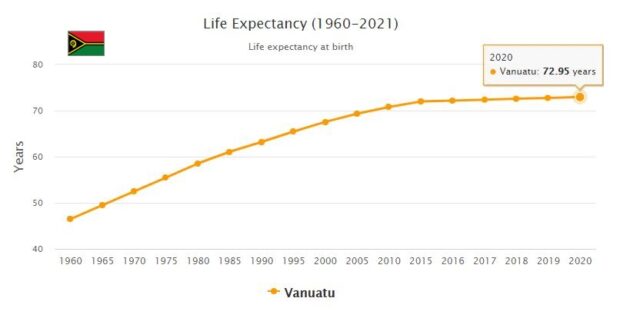Vanuatu is a small nation located in the South Pacific Ocean, comprised of over 80 islands. According to homosociety, it has an area of 12,189 square kilometers and a population of approximately 270,000 people. The capital city is Port Vila and the official language is Bislama though English and French are also spoken in certain regions. Vanuatu has a diversified economy with significant contributions from industries such as agriculture, forestry, fishing and tourism. It also has some natural resources including timber and gold as well as other minerals such as iron ore and copper. In recent years the country has seen strong economic growth with GDP estimated at 4% in 2019. Vanuatu also boasts some of the world’s most stunning beaches making it an ideal destination for those looking for a tropical getaway.
The first Europeans joined the archipelago in 1606, when Portuguese sailor Pedro Fernandes de Quiros established a short-lived colony on the island of Espíritu Santo. More thorough explored the area was only later, in 1768 by Louis Antoine de Bougainville and in 1774 by James Cook who gave the archipelago the name New Hebrides (New Hebrides). In the early 1800s, British and French missionaries came, followed by traders and farmers. The islands’ large sandalwood forests were exposed to predation, and a significant number of Melanesian inhabitants were recruited to work on the sugar plantations in Australia and Fiji.
British-French joint administration
In 1887, to secure the life and property of the island population and to create stable political conditions, the United Kingdom and France established a joint naval commission for the New Hebrides. The scheme was replaced in 1902 by permanent commissioners, and in 1906 took over a joint British-French condominium with separate, similar British and French administrations. See abbreviationfinder for geography, history, society, politics, and economy of Vanuatu.
During World War II was New Hebrides an important base for the Allies in the Pacific. After the war, the linguistic, religious and political divisions created by the condominium system became increasingly prominent. Decolonization therefore became a long and difficult process. The first election of a representative assembly in 1975 gave rise to fierce controversy between the two language groups. The condominium powers took the initiative of a unifying government to prepare new elections and the transition to independence.
Empowerment
The leader of Vanua’aku Pati, the Anglican priest Walter Lini, became the first, disputed leader of the island nation and was prime minister from 1980-1991. He was strongly critical of the former French colonial power. As soon as Lini was appointed, there was a revolt in the islands (Espíritu) of Santo and Tanna; the essentially French-speaking and strongly local patriotic rebels accused Lini of electoral fraud. Rebel leader Jimmy Stewart proclaimed Santos island independence as “the independent state of Vemarana”. The government gained control of the situation, but a new revolt followed in the same islands. Britain and France sent troops. After the proclamation of the Republic of Vanuatu on July 30, 1980, these troops were replaced by a force from Papua New Guinea.
- COUNTRYAAH.COM: Provides latest population data about Vanuatu. Lists by Year from 1950 to 2020. Also includes major cities by population.
Relations with France were poor after independence, especially in the years after 1987, when the French ambassador and other diplomats were expelled. Following Lini in 1991, a French-oriented coalition followed, and relations with France improved. Frenchmen who had been expelled for participating in the rebel trials were allowed to return. Vanuatu was the only South Pacific nation that did not endorse the condemnation of France’s nuclear tests in 1995.
Domestic policy has been unstable since the 1990s with frequent changes in government, party formation and factional struggles. Political feuds have rarely been linked to major ideological differences. Among the foreground figures was Barak Sopé, who, after a failed coup attempt in 1988, returned as prime minister in 1999-2001. In 2002, he was sentenced to three years in prison for fraud, but after a short sentence, he returned in 2004 as Foreign Minister. That same year, Alfred Maseng had to resign as the country’s president after forging papers to show that he had not been listed in the criminal record.
After all governments supported China’s line in the war with Taiwan, a great deal of attention arose when Prime Minister Serge Vohor announced in November 2004 that Vanuatu had established diplomatic relations with Taiwan. Vohor had to resign after a vote of no confidence, and the new government broke all agreements that had just been signed with Taiwan.
Tax havens
Since the 1970s, Vanuatu served as a ” tax haven ” for decades, and many international banks established themselves in Port Vila. At the turn of the millennium, the eye nation was accused by the OECD Economic Cooperation Organization of allowing the Russian mafia and other criminal syndicates to “launder” money in the country’s poorly regulated banks. After tightening the rules for the financial sector, Vanuatu was cleared by the OECD’s blacklist in 2003, but with very low or absent taxes and a lack of transparency around registered companies, the island state is still considered by many to be a tax haven.
Vanuatu is not a member of the international body CCAMLR, which regulates fishing and fishing in the Antarctic. From the island nation, super trawlers fishing for krill operate under convenience flags. Norwegian vessels from Aker Seafoods and Krill Seaproducts have also occasionally operated krill fishing in the Antarctic under the Vanuatu flag.
